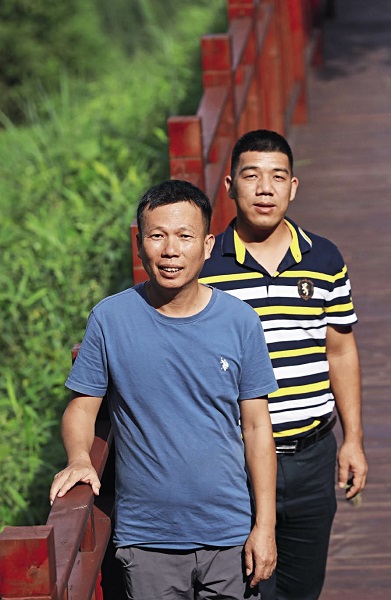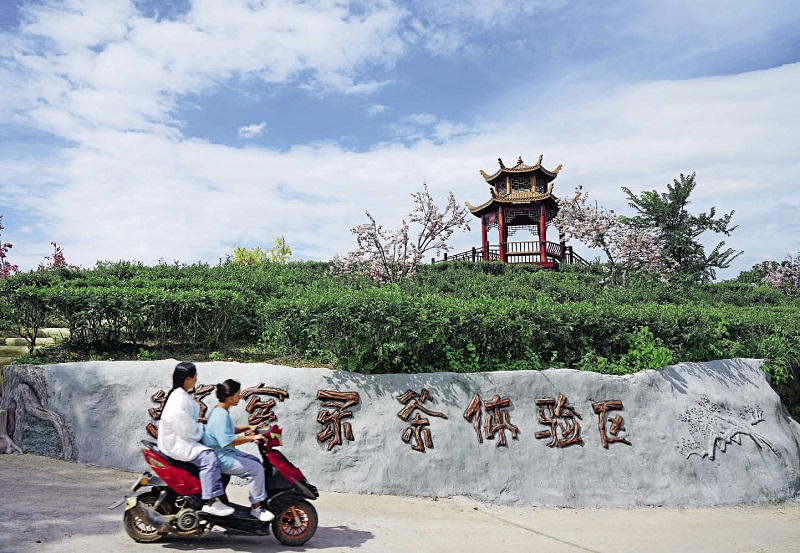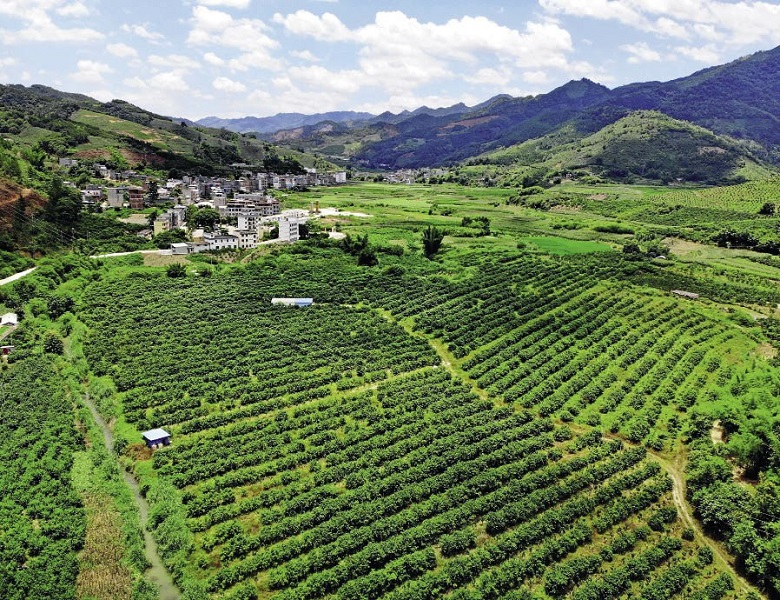Li Xianchu’s weekend plans have changed since this summer. One Sunday, for instance, his things-to-do list included visiting an agriculture product delivery center under construction, visiting a family that has been learning to live with paralysis, and checking out a “green bank.”
It’s a rigorous list but he’s used to a far more hectic schedule, especially since 2018, when the drive to alleviate poverty in China was just two years from the deadline and he was assigned to a particularly challenging area.
Yanglong is a remote mountainous village in Guangxi Zhuang Autonomous Region in southern China, home to the Miaos, an ethnic group who mainly make their living from farming and animal husbandry. Due to its inaccessibility and underdeveloped transportation, the village was impoverished when Li came there in 2018. He was sent to work as the village’s first Party secretary, a special post created to boost targeted poverty alleviation. Cadres of the Communist Party of China were sent to poor areas so that they could live there and work with the residents to devise income-generating projects appropriate to local conditions.

Li Xianchu (right) and He Gang (left), former and current first Party secretaries, take turns to help local poverty alleviation in Yanglong Village.
Finding an Effective Model
This has become an effective model for successful poverty alleviation work. More than 2.9 million people were sent to impoverished areas all over the country to work as first Party secretaries and boost poverty eradication efforts from the frontlines.
“Yanglong has become my second home,” Li said. Though his term there ended in April, he continues to go back on weekends to see how the villagers are doing and how the projects he started for them are progressing.
One project he had planned just before his departure was a delivery center for agricultural products. It is funded by China Energy Engineering Group (Energy China), a state-owned energy conglomerate that began assisting the village with targeted poverty alleviation projects in 2013. The delivery center will open up sales channels facilitated by Energy China and help the local farmers develop specialty farming industries. “It will also create more new jobs,” Li said.
Every time he drops in, Li visits the center to see how the work is progressing and discusses it with his successor He Gang, who is now the new first Party secretary in the village.
Then it is time to visit Li Zicheng, the head of a village family that once had a hardscrabble life. Li Zicheng became paralyzed after a waist injury, and his wife struggled to send their two children, a son and a daughter, to school. When he first arrived in the village and heard about the family’s plight, Li Xianchu obtained money for the children’s school fees from the organization designated to provide assistance funds for the village, and the family is grateful to him. He also helped make the family a member of the village cooperative so that they can receive a dividend every year. In addition, he helped them apply for benefits such as subsistence allowance and a disability subsidy.
That Sunday, Li Zicheng had even better news to give him. His daughter had got a job in Guangdong, a bustling industrial hub in the south, and his son had made it to the second grade of the secondary vocational school.
Besides Li Zicheng, other villagers flocked in to greet their former first Party secretary and tell him all their recent news. “Although I am no longer the first secretary, they still contact me for help,” Li said.

A tea resort in Yanglong Village.
A Vital “Green Bank”
After that, it was time to visit the “green bank.” Yanglong is known for its tea today. On the mountains, there are neat rows of tea plants. He calls the tea gardens the “green bank” of the village. “The high altitude here has a unique ecological advantage for producing high-quality tea,” he said. “Also, the growing tea industry is attracting more young people who had left the village to look for jobs outside to come back, and this vitalizes the village.”
Tao Yan and her husband, in their 30s, used to be migrant workers, looking for jobs outside the village. Tao’s parents had a small plot where they grew tea and other crops, but the money they made from it was meager. Then in 2012, a tea company, Guangxi Xilin Jiulongshan Tea Co., was established in the village and besides growing tea, it began to teach the villagers how to make tea products. The tea planting area in the village was expanded, and output increased.
However, that led to a problem. Wei Mingqing, president of the tea company, said since Yanglong had not yet built its tea brand at that time, the large-scale tea cultivation promoted across the country in 2014 did not have a big market.
In 2018, Li informed Energy China about the problem of unsold stocks. The group then began to organize livestreaming and online sales. It also invested over RMB 1 million (US $154,700) to buy land from the farmers and then contracted the land to the company.
The now booming tea industry provides new business opportunities for the villagers. Tao has taken over her parents’ tea gardens and started selling the products through livestreaming. “We not only sell local tea, but also showcase our beautiful scenery,” she said.
In 2020, the Jiulongshan tea garden was recognized as the county’s demonstration area for modern agriculture. Sales of tea have increased the average annual income of farmers by more than RMB 20,000 (US $3,092). The village tea gardens, covering over 200 hectares, have become the “green bank” of the farmers.
By the end of 2020, all poor households in the village had been lifted out of poverty, their per-capita income jumping from RMB 2,000 (US $309) in 2013 to more than RMB 14,700 (US $2,272).

Yanglong Village is surrounded by tea gardens.
Adding a Second String
On February 25, President Xi Jinping said China had achieved “complete victory” in the fight against poverty. However, the completion of poverty eradication does not mean the end of the goal. Rural development now has new goals: building thriving businesses, ensuring pleasant living environments, effective governance, and prosperity.
“The former first Party secretaries have helped lift Yanglong out of poverty and developed industries to promote the economy,” He Gang said. Now the responsibility is his as well.
Though the tea industry has brought benefits, there are only two or three seasons for tea, and tea farmers would remain idle the rest of the year if there is no other industry. So He Gang is planning to develop less investment-intensive but effective industries with local resources. Raising cattle and sheep in the large village farm on the mountains and aquaculture are two options he has come up with.
He managed to secure a startup fund of RMB 500,000 (US $77,300), which was used to buy good breeds of cattle and sheep for captive breeding to grow a characteristic farming industry. “In the past, the villagers sold cattle once a year. But now, they can sell the new breed of cattle twice a year, which has shortened the breeding cycle and brought quick profits,” He said. Yanglong has over 400 heads of cattle, which will eventually bring in an income of millions of yuan.